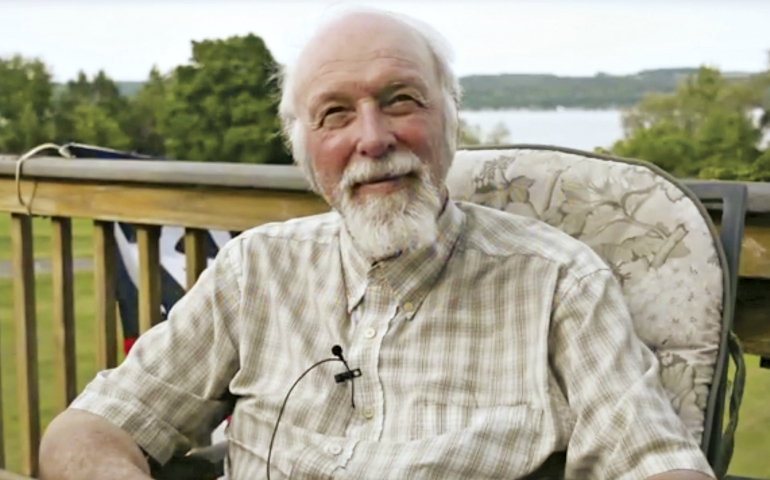
Fr. Bernie Survil in a 2015 interview (YouTube/WNY Peace Center)
In the early 1960s, after leaving his studies at Carnegie Tech in Pittsburgh to enter the minor seminary at St. Mary's, Kentucky, Bernard Survil looked ahead to a conventional and calm life as a priest in his home diocese of Greensburg, Pennsylvania.
From German and Lithuanian stock, neither of his parents went beyond high school. His father was a route man for a laundry company when the family lived in Olean, New York. As a tyke of one year in 1941, he waved one morning to a passerby on the sidewalk in front of his home. It was Thomas Merton, then teaching in the English Department at St. Bonaventure University and soon to enter a Trappist monastery in Kentucky.
After ordination in 1967, Survil was assigned to high school teaching and counseling, having earned a master's degree in that field.
A chance came to teach at Cathedral High School in Indianapolis.
"My bishop was very happy to have me go and get out of the diocese because I was speaking out against the war in Vietnam," Survil recalled on a recent afternoon when he visited my home in Washington, D.C., after a peace rally at the U.S. Conference of Catholic Bishops. He came with Jack Gilroy of Veterans for Peace. Both were guest speakers in my classes at American University and Bethesda-Chevy Chase High School. Their accounts of lifelong peacemaking opened minds and stirred hearts.
No surprise there.
Had he a taste for premonitions, the young priest might have known that in the coming years, and to this day, many more members of the hierarchy would see him as an agitator to be warily eyed as he kept jawing against the war as it worsened.
At Cathedral High, a visiting Maryknoll priest spoke at a school assembly. Enticed by the stories of missionary labors, Survil became an associate of the order and packed off to Bolivia in 1974 to learn Spanish. It was a move, he said, that "my bishop, once again, was very happy that I would be yet further away from the Greensburg diocese."
Working with the Maryknolls, Survil would give most of the next 25 years of his life in El Salvador, Nicaragua, Costa Rica and Guatemala, dispensing the sacraments, offering acts of mercy to impoverished parishes in indigenous areas, and more than once wondering if he would share the fate of priests, nuns, social workers and others on the hit list of dictators and death squads. Central American Catholicism in the 1970s and '80s was a church of martyrs.
He thought his time might have come on the afternoon government goons in El Salvador arrested, blindfolded and threatened him.
"Days later," he recalled, "I was kidnapped at the point of a gun in front of my residence. I was driven into Guatemala and turned over to armed men in a jeep. They could have been an execution gang. But I was jailed, accused of being in Guatemala illegally and deported. I was spared, for sure, because I was an American citizen."
With nine years in Nicaragua and 12 in Guatemala, he saw close up the violent effects of U.S. foreign policy when it supported or armed the repressive regimes of Somoza, Rios Montt and the Contras. It further radicalized him. In November 2003, he was among the thousands at the gates of Fort Benning, Georgia, protesting the U.S. Army's School of the Americas that trained soldiers, many of whom would returned to Central America as assassins. Survil was arrested for trespassing and did three months in a federal prison.
In 2011, he helped found the Association of U.S. Catholic Priests, an advocacy group that has more than 1,200 members from 132 dioceses.
"We know ourselves as Vatican II priests," he said. "The great majority of the current bishops were appointed by John Paul II and Benedict. The result? We have a sacramentalized church, one that is not prophetic."
For his efforts to alter that, whether speaking in parishes around the country to increase membership in Pax Christi or staging a 1987 sit-in in a pro-Contra congressman's office, Survil was once chastised by a bishop and another time given a canonical warning to desist.
For Gilroy, a longtime Endwell, New York, high school teacher who also did time for anti-war protests and who spoke in my classes, "Bernie is a genuine Christian. He truly believes in the Sermon on the Mount as well as the nonviolent teachings of Christ. If we had a lot of Bernies around, U.S. foreign policy would be much different. It would be a policy of compassion and generosity."
In the classrooms and my home, I was uplifted by the words and singular background of these two fine men. I remember especially one of Survil's thoughts, uttered frankly and modestly: "I consider my work valuable but I wish I could hear that said by my current bishop as well as the priests of my diocese of Greensburg."
I asked: "Do you think that will change?"
"My expectations are very low.
"Is that stopping you?"
"No."
[Colman McCarthy directs the Center for Teaching Peace, a Washington nonprofit. Find him on Twitter: @Colman McCarthy.]
Editor's note: The Association of U.S. Catholic Priests begins its annual assembly today, June 19, in Atlanta. The meeting, which runs through June 22, is focused on the theme "Peacemaking in Our Fractured Society." Watch NCRonline.org for Loretto Sr. Jeannine Gramick's report from the assembly.




